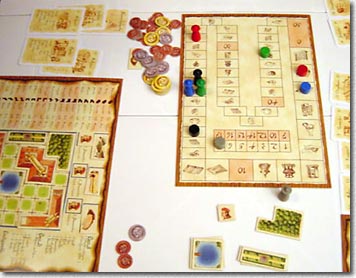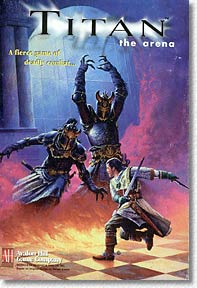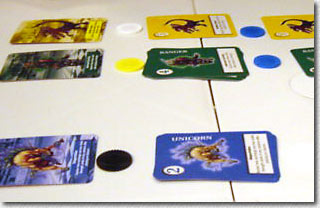
Some thoughts about strategy
It was interesting to play this game again, after Peter and me had thoroughly "overplayed" it while training for the German boardgame championships two years ago. Peter's big shock came when his supposedly foolproof tactic of playing with the "Gaukler" strategy was successfully countered with an astonishingly flexible and unforeseeable strategy by the winning the player in the championship.
"Fuersten" has been a bit out of the spotlight after a similar but perhaps slightly superior game, "Puerto Rico", has appeared on the scene. In both games the fascination lies in the joy of developing a purposely "unbeatable" superior strategy, only to discover that there is no valid basic strategy, as any successful strategy has to be adaptable to the circumstances. In both games you have only relatively few actions available in the game, and the player who most successfully uses these few actions to his own benefit will be the winner, not the player who stays with his strategy no matter what happens.

In "Fuersten" the "Gaukler" tactic is, theoretically, foolproof. You buy a lot of entertainers at the beginning of the game, as well as "Abwerbekarten" and additional "Personenkarten", to shock every other player with a barrage of successfully accomplished works in the last 3 rounds (usually going for around 8 works in the whole game). But if the other players know this tactic, they will make you pay dearly for your entertainers, and beyond a certain sum (1.200 Fl. in our opinion), they simply don't become viable anymore, as you'll end up having serious money problems (in our game, by the way, this tactic DID work, and gave Peter the victory).
We also speculated about a "Baumeister" strategy, which successfully carries through what many players try to do unsuccessfully in their first game, buying three "Baumeisters" and plastering your court with 7 or more buildings for additional victory points, also buying as many bonus cards and prestige cards as possible to achieve 2-3 monster works for additional benefits. These two strategies have a good chance of winning when playing with players who have a disorganized approach to the game. The "Baumeister" strategy could even coexist with the "Gaukler" strategy - both players would follow completely different goals and not even once conflict in the bidding phase.
| view/add comments |
But they stand no chance against the "organized disorganized" approach, which simply means doing what costs you least and benefits you the most (which is admittedly not always easy to fathom). Everything you do depends on the other player's actions - and, in the end, this is the true social aspect of gaming which we all love, otherwise we would be content with average and automated computer AI's (which, in the end, we aren't).

Bring through your bets! - How to win "Titan the Arena"
Although "Titan - the Arena" - this wonderful American variation on a design by Reiner Knizia - is by no means a pure strategy game (the luck of the draw DOES play a huge role), there are some obvious strategies and tactics that will help your bets to survive.
- THE LEFT PLAYER IS YOUR FRIEND
It is usually best to bet on the same monsters as the player on your left. Being the next player in line gives him the first opportunity to foil your well-made plans and destroy your favourite monster first. The more common interests you have the more chances your monsters have of surviving.
- THE RIGHT PLAYER IS YOUR ENEMY
Why? See above. If you let the player to your right constantly benefit of mutual bets, s/he will mostly have the better of it. Therefore avoid mutual bets with your right player. There is another benefit as well: if you play "destructive" cards (see below) against the player to your right, there will be 1 (in a 3-player game), 2 (in a 4-player game) or 3 (in a 5-player game) possible "allies" to possibly end the round before s/he gets a chance to act. The more other players there are the higher the chance they will accept your offer of an ending of a round that benefits them.
- PLAY DESTRUCTIVE CARDS BEFORE CONSTRUCTIVE CARDS
 Constructive cards are high cards played
on your own monsters. This is the only benefit these cards have. They will usually
be an invitation for other players to downsize them with another card played on
them. This will mean that you will have to act again by playing ANOTHER high card on
your favourite monster. You will end up being dependent on the survival of your own
monster, never having the chance of influencing the game in another way (the
"offering" of a round end to other players is essential).
Constructive cards are high cards played
on your own monsters. This is the only benefit these cards have. They will usually
be an invitation for other players to downsize them with another card played on
them. This will mean that you will have to act again by playing ANOTHER high card on
your favourite monster. You will end up being dependent on the survival of your own
monster, never having the chance of influencing the game in another way (the
"offering" of a round end to other players is essential).
If you play a negative "low" destructive card on other player's monsters, you achieve two things with one play only: you weaken their monster, forcing them to play more cards to strengthen their monster, and strengthening your own monsters, which are hopefully stronger than the new weaker monsters. You ACT, they REACT. Try to be the ACTING player as often a possible, and you'll keep in control of what's happening, and when combat rounds will end.
This rule will have to be adapted towards the end of the game, when combat rounds are short. It is then usually better to support your monster with a strong card, as each player tries to end the combat round as quickly as possible.
- WAIT BEFORE PLAYING YOUR SECRET BET
Usually most players try to play their secret bet as quickly as possible, but it is much better to wait until you see an open bet by ANOTHER player on the monster you secretly support, even better if it's the player to your left! The chances of your secret bet surviving will rise considerably. NEVER play a secret bet on a monster you also openly support from the start.
- TRY TO "CROSS BET" (not to be confused with "cross dressing")
Don't bet on the same old monsters you already support in the second (and further) betting round. This will be an invitation for murder to the other players. It is clear that the more players have an interest in a monster surviving the more it's chances of survival will be. Bet on a monster that another player strongly supports, and don't forget to look for the monsters the player to your LEFT supports.
- DON'T "SPREAD BET"
Punters know that "spread betting" is the first step to bankruptcy. You want to win, and you want to have the highest score possible. Concentrate on 3 monsters maximum (including your secret bet), as only 3 monsters will survive, period. And these 3 shall be YOUR monsters. Weigh your bets so that they are evenly divided among these 3 monsters. Bets on a 4th monster are only very rarely feasible, only in desperate situations were you want to avoid a total defeat should you go this road (or when of the monsters you originally bet on died).
- DON'T UNDERESTIMATE THE "REFEREE" CARDS
Most players are annoyed by owning referee cards instead of "real" cards (especially the "Master referee"). But there are situations where no "real" card you play benefits you because you have a bad hand. Save your "master referee" card for exactly this situation and you will avoid playing cards that benefit others.
- THE NOBLE "ART OF OFFERING"
Always play cards (if possible) that give the players playing directly after you the opportunity to fulfil their wish of ending the round with their monsters surviving. Of course the trick is to offer them something that will also let YOUR monsters survive. Knowledge of secret bets is essential for this - players might have played high cards on a monster they don't openly support, usually a sure sign of secret support. There might even be "offer" situations where the player to your left will lose a monster that he will accept losing - to make other, more important bets to him/her survive (of course you want all YOUR bets to survive, hehe).
| view/add comments |
Of course all this is theory, as you simply might not have the cards that will enable you to do all of the above in the right situations. But following these guidelines as closely as possible will ensure you a good place at the end of the game, even if it's not number one.
Have fun!
Unusual game, no player ever lost more than one die (so we were always pretty close to the truth). In the end Peter won with two dice against Moritz 1 die.